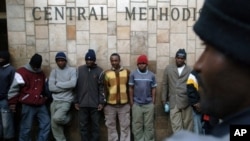Zimbabwean economic refugees are struggling to become legal in South Africa. It is a long and arduous process for many Zimbabweans who fled from home during the past 10 years.
Tens of thousands of Zimbabweans are attempting to legalize their status in South Africa. They have been given a deadline by South Africa of December 31 to submit documentation seeking permission to work and live in South Africa.
Most illegal Zimbabweans in South Africa say they fled to survive and earn money for their families and some fled fearing political persecution from President Robert Mugabe's Zanu PF Party officials.
Many people in Zimbabwe only survive with money sent home by relatives working in South Africa. A laborer, Peter, from Harare, says he does not want to be illegal in South Africa.
"My family is starving, so no jobs in my country, so that is why I forced myself to be here in South Africa. But my intention is not of being here illegally, but because of the situation is the thing which forced me to be here illegally," noted Peter.
Hundreds of thousands of Zimbabweans have been deported from South Africa during the past 10 years. Many of them return, despite harassment and fear of xenophobia in South Africa.
But Home Affairs Deputy Minister Malusi Gigaba explains that South Africa is trying to regularize their stay.
"Now what we are trying to do is to ensure that the Zimbabwe nationals who are in the country are regularized," said Gigaba. "They are being given the necessary permits, whether it is to study, work permits so they can stay securely and properly and be able to work to live and to move without any inhibition."
To stay, Zimbabweans illegally in South Africa, many of them destitute, have to produce a passport, a letter from an employer or proof they are studying in South Africa.
Peter, the laborer from Zimbabwe, says he has been four times to the Department of Home Affairs in central Johannesburg. He says the South African personnel there are kind, but are only managing to process about 200 Zimbabweans a day. He says he is lucky that he has a Zimbabwe passport, but securing the other documentation took time and waiting in line two days.
"I am processing them, my passport and my documents are right, and I am submitting them, but there is a big, big, big queue," added Peter.
Now he has to wait to hear if his application is successful. He said that for some the wait will be a lot longer, because many Zimbabweans in South Africa do not have passports. The Zimbabwean consulate in Johannesburg is besieged with applications for passports.
Thousands of illegal and destitute Zimbabweans sleep at the Methodist Church Hall in central Johannesburg. A spokesman for the church said Wednesday many of those it shelters are trying to become legal, but are discouraged by the long lines outside home affairs offices.
According to South Africa, the largest density of illegal Zimbabweans is in Johannesburg. Many Zimbabweans in South Africa say December 31 is too soon to process all those who want to become legal.
"There is a call for the extension of the deadline, [but] as far as we are concerned there is enough capacity to meet the deadline of 31 December and so we are not going to shift this deadline," added Deputy Minister Gigaba, who says the deadline will remain.
South Africa has also offered amnesty to all Zimbabweans who have fraudulent South African birth certificates or identity documents. But according to Home Affairs officials in Johannesburg few have come forward seeking amnesty.
Zimbabwe Immigrants Trying to Legalize Status in South Africa












